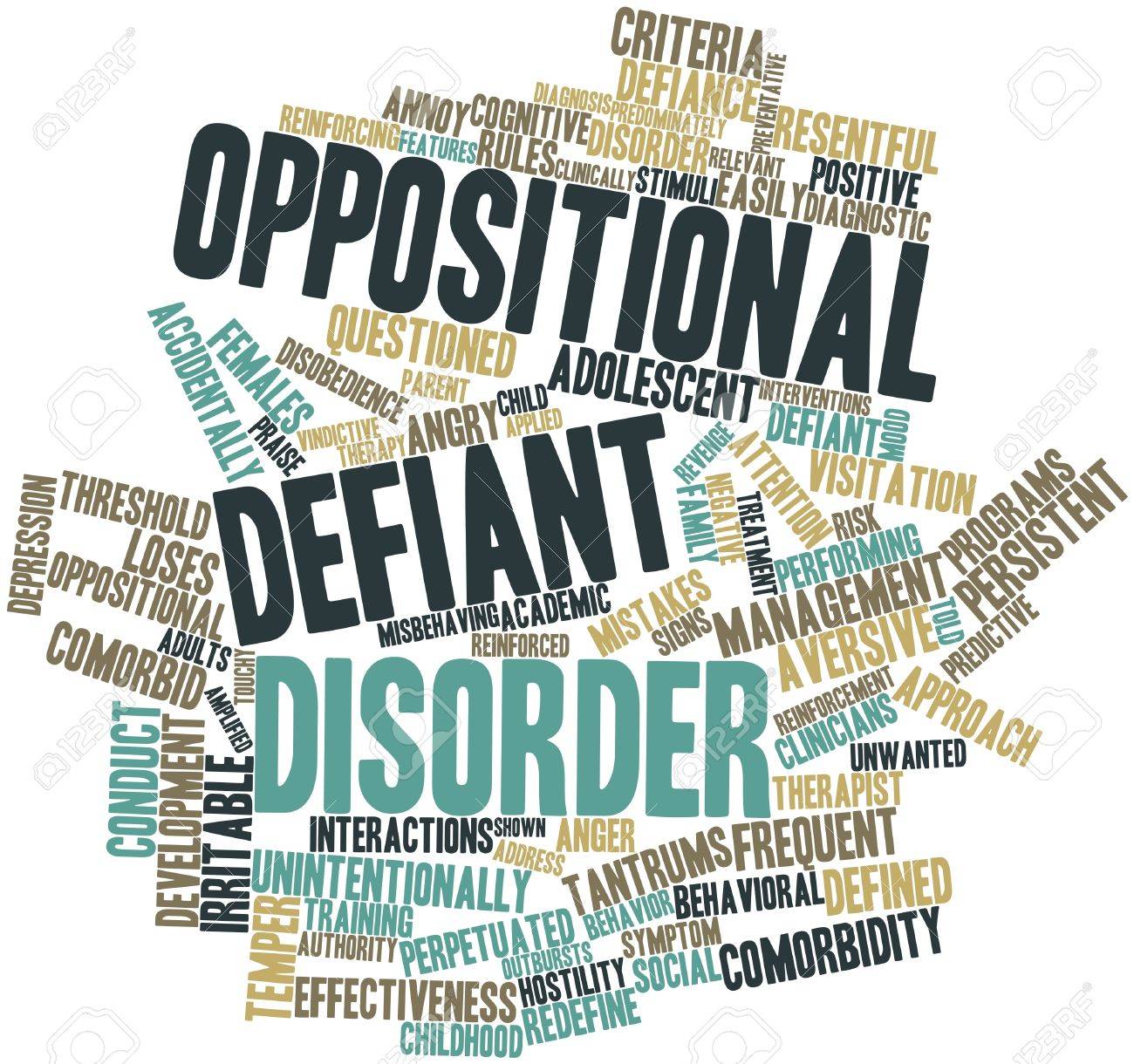Users Who Spiked

OPPOSITIONAL DEFIANT DISORDER: A THOROUGH INVESTIGATION
Private Notes
Private Notes
Notes
Oppositional Defiant Disorder (ODD) is a condition in which the individual acts out in ways of uncooperativeness, hostility, and has been described as an annoyance to authority figures. This psychiatric disorder is best known for the two sets of problems: aggressiveness and purposive annoyance.
In order for a diagnosis of ODD, these behaviors must exist in all areas of the person's life, both at home and school. This type of acting out must be occurring more often than what is considered normal for their age and is typically seen before the age of 8. Researchers have found that ODD occurs in 2%-16% of children and adolescents and has been seen as more prevalent in boys.
Description of ODD
This disorder has several commonly known symptoms including temper tantrums and blaming others for their own mistakes and behaviors. In school, they tend to have a low frustration tolerance for the completion of assignments. As teenagers, there is a noted increase in chronic lying, stealing, and shoplifting. Lowering of self-esteem and the development of depressive symptoms may occur due to greater isolation from family and friends.
Causal Factors
While there is no known direct cause of ODD, there are several factors that play a role in its development. Biological factors include the possibility of abnormal amounts of neurotransmitters. Other reasons may be defects or injuries to certain areas of the brain. Genetics play a role in that a family member's mental disorder is a link to the vulnerability of developing ODD.
As with all things in life, environment plays a big part in a child's development. In the case of ODD, it has been found that dysfunctional family life, family history of mental illness and/or substance abuse, and inconsistency in discipline may be key factors to consider when diagnosing oppositional defiant disorder.
Risk factors for the development of ODD include the mother's smoking during pregnancy. It is estimated that a child is 2-3 times more likely to develop ODD if the mother smoked during pregnancy. If a parent is an alcoholic and in trouble with the law, children are 3 times as likely to have ODD. That comes out to be about 18% of known cases.
**Other risk factors include:
**Friends engaged in substance abuse and delinquent behaviors
**Peer rejection
**Witnessing family violence
Effects of ODD
Researchers have found there are three different paths a child with ODD will take as they grow-up. Some lucky few will simply outgrow the disorder. Others have been known to develop other disorders like Attention Deficit Hyperactivity Disorder (ADHD) or worse, Conduct Disorder.
The rest of the time the person will just continue to have ODD without any other symptoms. This group of people will find life easier if they are able to work for themselves and stay away from alcohol as adults. Their tendency to irritate and annoy others leads to a lonely life.
When comparing ODD to ADHD, people have found that ODD is much more difficult to deal with for family and friends. This is due to the aggressiveness of ODD versus the compulsiveness of ADHD. Additionally, ODD's purposeful annoyance to get a rise out of others is more detrimental to relationships than ADHD's acting without thinking.
Boys Versus Girls
The common belief regarding ODD is that it occurs more frequently in boys than girls. Researchers are now considering that this may not be accurate for two reasons. First, the criteria for diagnosing ODD was developed using samples composed mostly of boys. Secondly, they are finding that girls express symptoms differently and thus have gone unnoticed.
One example is the expression of defiance. Boys are known to defy actively by arguing while girls will defy passively by ignoring requests. Another example is the expression of aggressiveness. Boys are more likely to be physically aggressive whereas girls express what is called relational aggression. They will act in ways that cause others' friendships to dissolve. This is due to the fact that girls value group belongingness.
Treatment Methods
There are a great number of suggestions as to what treatment methods should be used in helping adolescents and their families deal with ODD. Some therapists use psychotherapy that is aimed at developing healthier ways of expressing and controlling the anger and aggression.
Cognitive-behavioral therapy is good for reshaping the way the teen thinks and feels about their situation in order to change the behaviors. Family therapy is essential for helping all members to work on their interactions and relationships with one another. Some parents may consider seeking out Parent Management Training to aid in altering the child's behavior.
While there are no known medications available to specifically treat ODD, Dr. Haines suggests that if other symptoms exist such as depression, that use of pharmaceuticals may be effective in treating those symptoms. Other cases may need anti-anxiety medications or other suitable prescriptions if symptoms of ADHD exist.
Some therapists have suggested parenting support groups and classes as an intervention for coping and raising a child with ODD. Furthermore, there needs to be a strong working relationship between parents of the child and the teachers at his/her school in order to create consistency in the child's life and environments.
The website of Focus Adolescent Services listed the following strategies for parents of teenagers with ODD.
**Listen to your teen and avoid arguing
**Talk about morals and ethical behavior
**Deal with what's important
**Be consistent and hold your ground
Bartholomay and Keen have several great ideas in regards to treatment methods and ways for parents to cope. They emphasize the importance of the adults working together and to challenge what the child says about how they are being treated by others.
Because of the tendency of teens with ODD to blame others, as a parent or teacher you cannot always trust that what you are hearing is the truth. Adolescents with ODD are looking to cause problems between adults so by working together, communications will clear up any attempts by the child to irritate or cause fighting among parents and/or teachers and principals.
Many therapists are finding behavioral modification has been successful in the treatment of ODD. The key to this success has been the focus on positive behaviors and not to react emotionally to the negatives. Teens with ODD are looking to get a rise out of adults, so by ignoring these actions of the teen it prevents them from pushing those buttons they have been so good at doing.
If behavioral modification sounds like the way to go, Bartholowmay and Keen say to keep in mind the following suggestions for greater success:
Target only one or two behaviors at a time
Be clear on expectations
Be consistent
Reward with activities, not money or material possessions
Rules need to be simple and straightforward
As mentioned before, there are no medications specifically designed for ODD, but according to Bartholomay and Keen there are three situations in which some type of meds should be considered:
When a coexisting condition such as ADHD exists
If non-medical interventions are not working
The symptoms are so severe that there is a fear for the child's safety
Conclusion
Oppositional Defiant Disorder is a very difficult situation to deal with and causes a great deal of problems for the teen and his/her family. By knowing more about the causal factors of this disorder, we have the opportunity to help prevent occurrences of ODD in the future.
However, most importantly as parents, teachers, and therapists, we need to be aware of what is going on in the child's life and work together to improve the situation. By using the types of treatment methods that others have found to be successful, our teens of today have a better chance of overcoming this negative disorder.
Now that there is a better understanding of what ODD is and how to deal with it, life with an ODD teenager doesn't have to be a living hell anymore. Therapists have been able to determine many successful methods for the treatment of this disorder.
The key is to find what works for the individual situations and not to give up hope. Further research into the possible causes of this disorder is important in the continuing effort to prevent further cases of ODD from developing. In addition, more studies on gender differences of Oppositional Defiant Disorder are an absolute necessity in order to ensure that our young ladies are being properly diagnosed and treated.
References
Bartholomay, S. and Keen, B. (2006). NotMyKid.org. Oppositional Defiant Disorder.
http://www.notmykid.org/parentArticles/ODD/default.asp
Chandler, J. (2006). Oppositional Defiant Disorder (ODD) and Conduct Disorder (CD) in Children and Adolescents: Diagnosis and Treatment
http://www.klis.com/chandler/pamphlet/oddcdpamphlet.htm#_Toc135732017
Focus Adolescent Services. (2006). Teen Behavior Problems and Behavior Disorders.
http://www.focusas.com/BehavioralDisorders.html
Haines, C. (2006). WebMD. Mental Health: Oppositional Defiant Disorder.
http://www.webmd.com/content/article/60/67118.htm
Ohan, J.L. and Johnston, C. (2005). Gender appropriateness of symptoms criteria for Attention Deficit Hyperactivity Disorder, Oppositional Defiant Disorder, and Conduct Disorder. Child Psychiatry and Human Development, 35, 40, 359-381.





































